We discuss promoting skills pathways and attracting future talent
Schools | Written by: Rachael Dorman | Thursday 5 June 2025
During Scottish Apprenticeship Week, young people from across Scotland took part in our ‘A World of Work Tasters’. Delivered across three days, young people attended for one day and took part in seven workshops designed to raise awareness of routes and pathways to careers in construction and traditional skills, including Modern Apprenticeships.
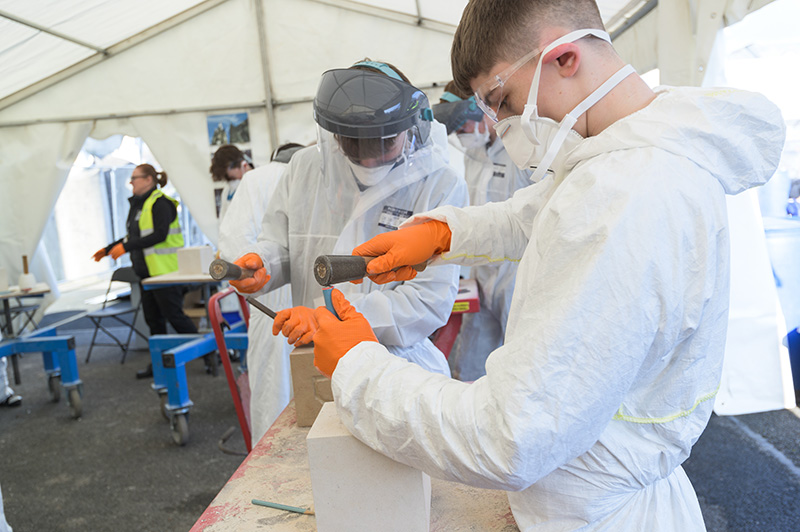
Young people getting hands-on experience of stonemasonry.
Rachael Dorman, our Programme Delivery Manager and Rachael Topping, Learning & Development Advisor for Morgan Sindall Construction, discuss the benefits of collaboration and the impact employer engagement can have on young people.
Where did the inspiration come from?
Rachael D: Rachael from Morgan Sindall approached my team at the Engine Shed to support the development of training based on traditional buildings and materials. We both expressed concerns over growing skills shortages, and we knew a hands-on event would be a great way to inspire young people.
Rachael T: Absolutely, my colleague Nicole and I were so enthusiastic that the idea just snowballed. We brainstormed it on a train and came up with the World of Work Tasters event. The next step was to design an event that showcased some of the day-to-day activities that take place in construction, with the priority being hands-on workshops. Giving young people the opportunity to explore their likes and dislikes was key and we knew it would have a big impact and potentially help them see the huge range of skills that exists. The first World of Work Taster event took place in October 2023.
“I enjoyed not only having a go at each trade but meeting the people associated, and the kind of people you might end up working with.” – School Participant
What did you learn from the first event?
Rachael T: The feedback from the first event in 2023 showed us that young people were more informed to choose a career in construction following the event. It also revealed that young people wanted more time at the workshop stations. We knew that a more meaningful experience meant they needed more hands-on time and more opportunity to chat with the industry experts who were hosting their workshops, respectively. So, we extended the 2025 event to three days and doubled the time in each workshop from 20 minutes to 40 minutes.
Why did you deliver a second event?
Rachael T: We want everything that we deliver to be meaningful in addressing the skills shortage. From the success of the first event, it was clear that the work tasters event opened new doors for young people. They walked away inspired.
Rachael D: Looking at the bigger picture, the skills crisis isn’t going away. A recent Historic Environment Scotland (HES) article revealed that the demand for heritage skills is rising rapidly due to the need to repair and retrofit traditional buildings, with factors such as climate change exacerbating existing problems. Around 71% of traditionally built housing in Scotland needs critical repairs, with an estimated 10,000 new jobs needed over the next decade to maintain and adapt such properties. At the same time, there is a serious lack of training opportunities for people who want to learn traditional skills.

School participants at the event tried on the Engine Shed’s virtual reality headsets.
Why the Engine Shed?
Rachael T: We thought the Engine Shed was the perfect space to create talking points for young people, promoting greener futures and sustainability while being able to point to their surroundings to see the real impact of these practices. In the sustainable Engine Shed building there are booths made from repurposed gym floors, the stone was salvaged from the dismantled Seaforth bridge next to the site, window repairs relied on recycled wrought iron, the closest match to the original mild steel used. All features that speak to the site’s rich history.
What did young people experience and what partners were involved?
Rachael T: We worked with Developing the Young Workforce (DYW) on both events. They see this event as being a great example of how businesses can work together to influence young people who are undecided on their career paths.
We delivered seven workshops across the day and the young people took part in every single one of them. Alongside Morgan Sindall’s ‘Count on Us’ quantity surveying workshop and HES’ ‘Carving Out Construction’ stonemasonry activity, the input from our subcontractors was vital.
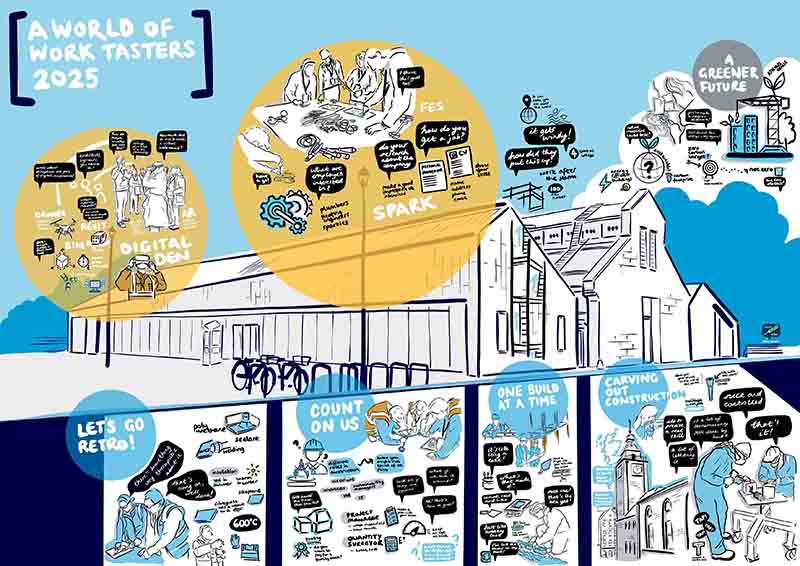
An illustration of the event created by Jenny Elliott on the day, capturing all the different workshops young people took part in. © Jenny Elliott
We truly appreciate their help in making the event so special. Key workshops delivered were:
- Digital Den by Morgan Sindall BakerHicks, a creative workshop focused on architecture and design.
- A Greener Future by AtkinsRealis, a workshop designed around sustainability and showcasing green jobs in the industry.
- Let’s Go Retro by SIKA, a retrofitting session that enlightened young people on how to repair roofing and use tools.
- One Brick at a Time by Lesterose, a brickwork taster that saw the young people build an actual structure on the grounds outside the Engine Shed.
- Spark by Forth Electrical Services (FES) ignited interest with a mechanical, electrical and plumbing workshop. Their workshop also included a conversation about interview etiquette and expectations in the workforce, helping to shape the next generation to be work-ready and not miss out on opportunities.
Rachael D: The Engine Shed suffered some damage to our roof during Storm Eowyn and this saw us clad in scaffolding. During a call with Rachael I shared that the work wasn’t going to be complete by the event and suggested that perhaps we could take things one step further and send the young people up on the roof. One thing I learned about Rachael Topping that day, is she likes a challenge. Within a week Kirsty Allan from City Access Scaffolding was agreeing to the workshop and with just a couple of weeks to go a final workshop was added. This saw young people dressed in 5-point PPE (personal protective equipment) receive an introduction to harnesses and climbing a fully risk assessed scaffolding to look at our roof repairs. An experience that not one of them had ever had before.
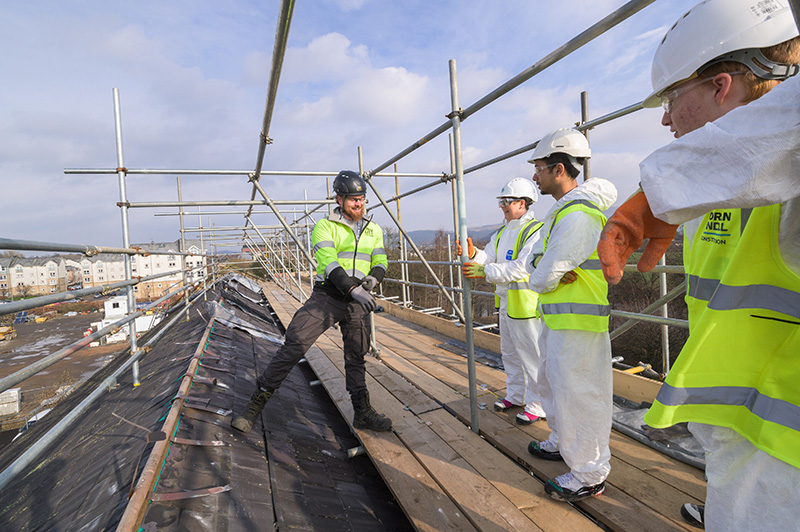
Young people accessing the Engine Shed roof via scaffold and learning about roofing repair.
“Interactive activity with skilled tradespeople and professionals who share their experiences and career journeys, challenges perceptions about the industry. There is no one better placed to inspire, empower and excite the next generation about the range of opportunities that exist.”- Caroline Thomson-Noble, Construction Work Tasters Project Coordinator, Developing the Young Workforce
What was the impact?
Rachael D: The feedback received from young people showed that before the event only 69% were considering a career in construction and that jumped up to 83% following their experience. That’s a great achievement.
Rachael T: It’s wonderful. Over the course of the three days, we also became aware of so much positive impact.
Some of my highlights were finding out that:
- we have been instrumental in helping six young people secure apprenticeships
- one young person was offered an unconditional apprenticeship and full sponsorship during their apprenticeship due to excellent behaviours and talent demonstrated
- two young people made an industry contact who offered to support a day release scheme to support their pathway into architecture.
- three young people were identified as potential stonemasons due to talent demonstrated
Rachael D: The event also had a massive effect on the partners and the teachers who accompanied the young people. I heard one of the partners say they found it so satisfying to be able to show young people what was involved in their job. A teacher said “No day at school can give them the experience they’ve had here today! Invaluable!”
“The event was extremely informative, the pupils loved it. Our staff also gained insight into the wonderful world of construction and its many pathways. It was great to see some young apprentices who could inspire our young people.” – Holly Lithgow – Principal Teacher of Skills, Work and Destinations, Chryston High School
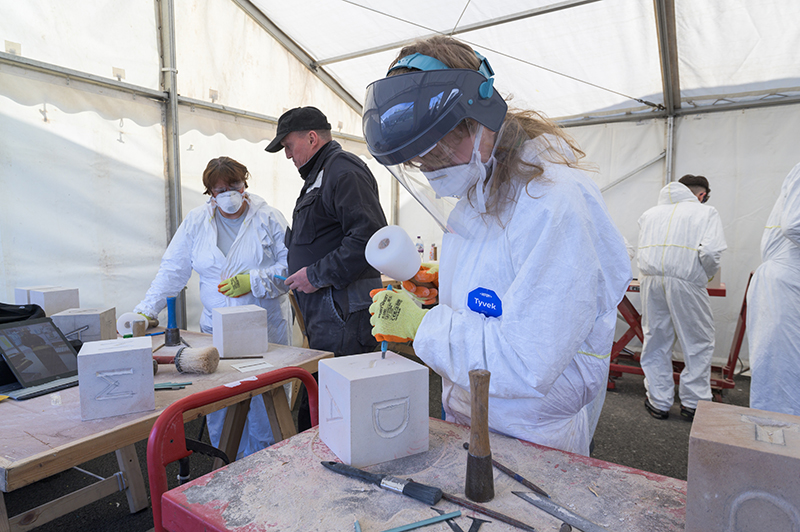
Young people getting hands-on experience of stonemasonry.
Why did Historic Environment Scotland get involved?
Rachael D: Learning is threaded throughout everything we do, and the Engine Shed is an accredited training centre. Our aims include delivering training for the sector which is also a direct deliverable of the Skills Investment Plan. We deliver stonemasonry apprenticeships and skills programmes focused on craft skills, traineeships and employability skills. We also create learning specifically for those who already work in the sector, we call these learning sessions.
But before you even get to sector support, we have a responsibility to attract young people to want to be part of it. So, we also look for opportunities to inspire the future workforce. A quote I heard that stayed with me is that if a young person engages with four employers whilst they are in education, then they have a better chance of entering a positive destination when they leave school. What better way to continue that work than through working with other employers such as Morgan Sindall who feel as passionately about engaging with young people.
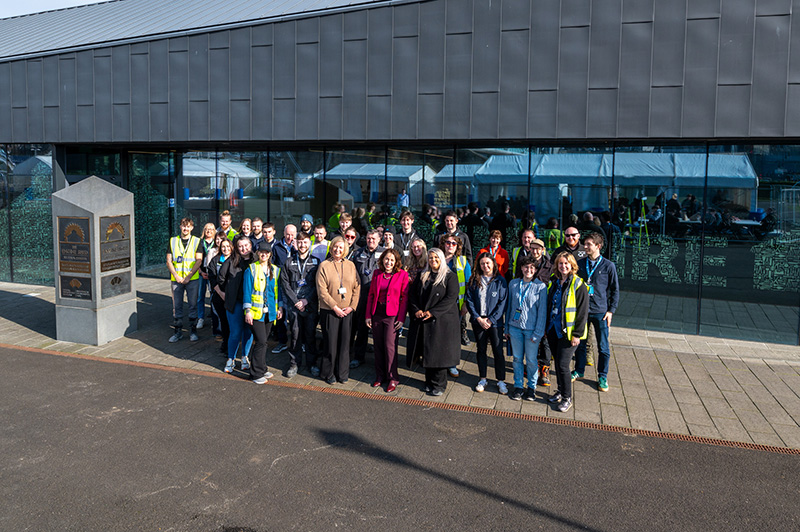
All of the partners who contributed to the event with Historic Environment Scotland (HES) senior leadership in front of the Engine Shed.
Why should partners engage in these kind of activities?
Rachael T: The skills shortage is impacting subcontractors faster than anyone else, so engaging in events like this showcases careers in the industry to young people and anyone wishing to consider a career in construction. We also provided an opportunity for attendees to have direct contact with the event partners, so in some cases they can go on to follow up around activities like work experience, site visits, placements and jobs. This is all working towards narrowing the skills gap here in Scotland.
Rachael D: There’s a serious possibility that we won’t reach Net Zero without traditional skills and materials. Therefore, promotion of roles that will help Scotland reach our Net Zero target by 2050, are vital. Another is ‘mythbusting’. A recent Construction Industry Training Board (CITB) publication stated, ‘the more people know about the industry the more attractive they tend to find it.’ There are still stereotypes, preconceptions and so many myths and the best way for young people to gain insight is directly from people in industry.
Now more than ever, we need to act. To ensure we can continue protecting Scotland’s heritage we must have a skilled workforce in the pipeline. Inspiring young people is vital and ‘A World of Work tasters’ makes significant impact. Young people attend with gaps in their knowledge about careers and leave with new aspirational doors open to them. Just one day of engagement with professionals can really do that.
What’s next?
Rachael T: World of Work Taster 3 of course! But before that we are exploring delivery of another event in the Highlands with Historic Environment Scotland (HES) in the next six months.
Rachael D: We continue to support outreach work through working in partnership with Build Your Future to support local skills demonstrations, and through our Craft Your Career traditional skills programme. Through Craft Your Career we are working in partnership with schools in Edinburgh to pilot using stone carving and roofing within the school curriculum to gain a National 5 in Creative Industries. Another exciting project is the partnership with Scottish Canals to develop a Skills Centre for Excellence in Falkirk.
Explore opportunities to engage with us by browsing What’s On at the Engine Shed.
For more information on how we’re engaging with sector partners on skills, read the Skills Investment Plan for Scotland’s Historic Environment.
If you work in related sectors and would like information on how to engage with education audiences contact Developing the Young Workforce.
Find out more about Scottish Apprenticeship Week.
About the author:
Rachael Dorman
Rachael Dorman is the Programme Delivery Manager at the Engine Shed. Rachael enjoys working with experts from across the HES estate, as well as strategic sector partners to ensure messages about traditional buildings, materials and skills are shared for generations to come.
View all posts by Rachael Dorman
- « Why we need digital technologies for architectural conservation
- Improving fire safety in traditional buildings »
Comments are closed.



